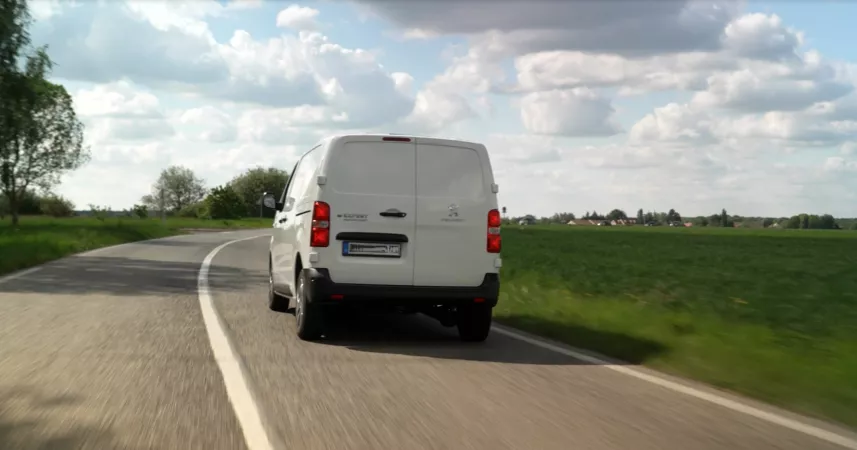Understanding the benefits of hydrogen vans

With the growing number of low-emission zones (LEZs), mobility linked to professional and commercial activities in urban and suburban areas is under strong pressure to decarbonize. The "last mile", crucial for deliveries, raises major challenges in terms of reducing pollutant emissions, but also in terms of congestion and traffic restrictions. Because of their major role in urban logistics, Light Commercial Vehicles (LCVs) are directly involved.
Electrification is seen as the most promising way to decarbonize these vehicles, and hydrogen technology offers significant advantages over battery-electric vehicles.
I. Last-mile constraints in urban and suburban areas
The "last mile" refers to the final phase of the delivery process, where parcels are transported from distribution centers to end customers. This stage is particularly crucial in urban and suburban areas, with complex challenges to overcome.
1. Traffic restrictions
Many cities are introducing low-emission zones (LEZs) to improve air quality. These regulations restrict or ban access to city centers for the polluting vehicles. For fleet managers, this means a growing need for vehicles that comply with strict environmental standards, which may require significant investment in zero-emission solutions.
2. Environmental issues
Pressure to reduce CO2 emissions and fine particles is growing. Fleet managers are therefore being urged to adopt greener solutions to limit their environmental impact. This requirement is particularly pressing in densely populated urban areas, where air quality is a major concern for local authorities and residents alike.
3. Need for efficiency and uptime
City centers and suburban areas are often saturated with heavy traffic and frequent traffic jams. This congestion not only leads to delivery delays, but also increases operational costs due to fuel consumption and vehicle idelness. At the same time, consumer expectations in terms of speed of delivery are constantly on the increase, especially with the rise of e-commerce. Fleet managers must therefore optimize their routes and minimize downtime to meet these demands. This requires vehicles capable of delivering reliable, consistent performance, even in difficult traffic conditions;
II. The benefits of hydrogen vans
Hydrogen vans offer an innovative, high-performance solution to the challenges of urban and peri-urban logistics.
1. Zero emissions, no noise pollution
Hydrogen-powered vehicles produce only water vapor as a by-product of their operation. There are no CO2 emissions and other gases or harmful particles. This feature is crucial for complying with environmental regulations and improving air quality in urban areas. Furthermore, these vehicles are very quiet, considerably reducing noise pollution, which is particularly useful for night-time deliveries and in residential areas.
2. A range of up to 600 Km
Hydrogen vans offer a range comparable to that of traditional diesel vehicles: from 400 to 600 km depending on the size of the tanks installed. These vehicles can therefore cover long distances without the need for frequent refueling. This is particularly beneficial for delivery routes on the outskirts of towns, and for operations requiring a high degree of flexibility.
3. Fast refueling time
One of the major advantages of hydrogen-powered vehicles is their extremely rapid refueling time. In less than 5 minutes, a vehicle can be refueled and ready to go again, in stark contrast to the hours needed to recharge battery electric vehicles. This rapid refueling minimizes downtime and optimizes vehicle utilization, improving overall fleet efficiency.
4. Acceleration performance of the electric powertrain
Hydrogen vans offer excellent acceleration performance, comparable or even better to that of diesel vehicles, thanks to the electric drivetrain powered by the fuel cell technology that provides immediate power. This feature is essential for urban deliveries, where frequent stops and starts require responsive, powerful vehicles.
5. No impact on vehicle payload and volume
Unlike battery-electric vehicles, the hydrogen fuel cell system does not affect payload or available cargo volume. Hydrogen tanks are integrated so as not to encroach on cargo space, enabling fleet managers to maintain maximum transport capacity.
6. Ease of operation for fleet managers
Hydrogen refueling infrastructures can be centralized, with a single on-site refueling point sufficient to supply the entire fleet. This simplifies fleet management and reduces the costs associated with installing and maintaining multiple refueling points. In addition, partnerships with hydrogen suppliers can facilitate the operation of these infrastructures.
7. Competitive TCO
The total cost of ownership (TCO) of hydrogen vans can be comparable to that of diesel or battery electric vehicles, depending on available subsidies and due to reduced operating and maintenance costs. Fleet managers can achieve significant savings over the long term, making this technology not only environmentally friendly but also economically viable.
In a few words
Hydrogen vans offer an innovative, performant and sustainable solution to the challenges of urban logistics. Their extended range, rapid refueling time, acceleration performance and absence of pollutant emissions offer additional advantages over battery-electric technology. These vehicles offer greater flexibility and efficiency, while complying with strict environmental regulations.
> Download our e-book : Hydrogen Fuel Cells for LCVs & Buses: 5 Key Considerations for Product Selection and Technical Specifications
